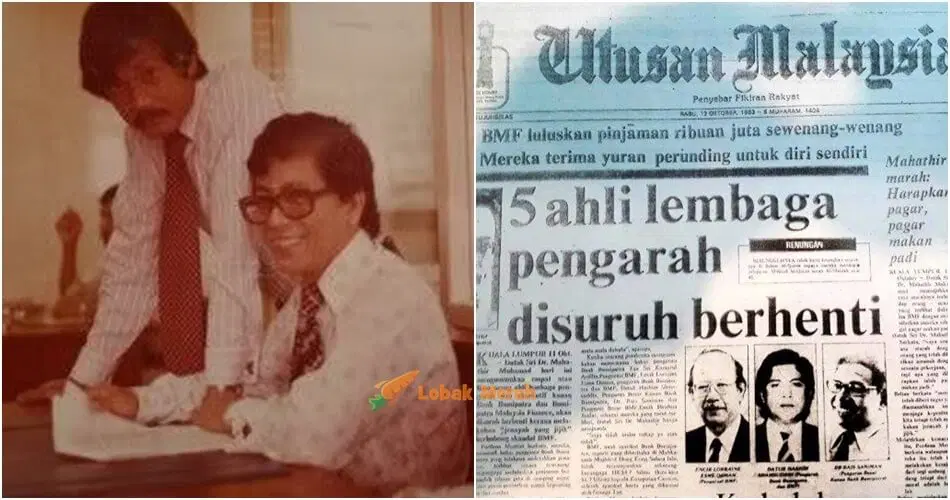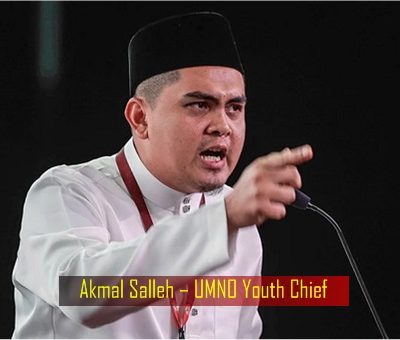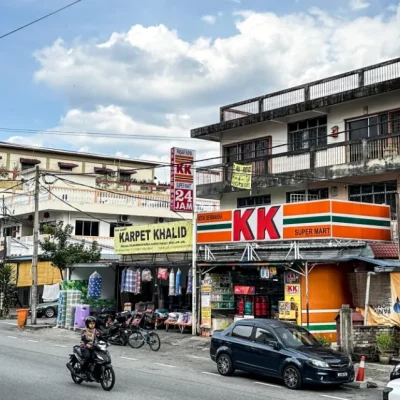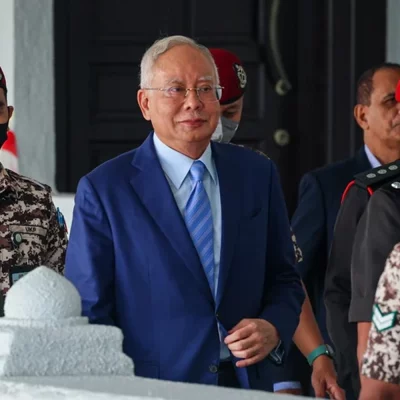The US Central Intelligence Agency (CIA) has claimed the Mahathir administration was involved in the Bumiputera Malaysia Finance Limited (BMF) scandal that the country cost billions in the 1980s.
The conclusion was contained in a report that was part of a trove of 13 million pages from 800,000 of the agency’s files that were declassified and released online last week
In the report’s summary, it said that Tun Dr Mahathir Mohamad’s position as prime minister then was at risk due to the graft scandal, as the Malaysian government-owned Bank Bumiputera (Bank Bumi) reputation was marred by the “questionable” operations of the BMF, its wholly-owned Hong Kong subsidiary.
“Circumstantial evidence suggests that the scandal extends into the Mahathir administration. As a government-owned bank, Bank Bumi is closely monitored by both the Finance Ministry and Central Bank and no important decisions are made without their agreement of knowledge,” the nine-page report titled “The Bank Bumiputera Scandal: More Trouble Ahead for Malaysia’s Mahathir?”
“It is unlikely that the government was unaware of Bank Bumi’s increase on lending limits for its overseas branches to allow more funds to be channelled to Hong Kong,” the CIA report added.
Bank Bumi and its offshore subsidiary BMF issued billions in bad loans to numerous Hong Kong property speculators, including the Carrian Investment Limited (Carrian Group) between 1979 and 1983.
The scandal cost nearly US$1 billion (RM3.57 billion) in two botched loan deal. It also involved the brutal murder of a young Malaysian Bank Bumi auditor.
The scandal affected Dr Mahathir’s leadership within Umno and Barisan Nasional (BN) following the now-defunct Carrian Group’s former chief executive George Tan’s move to declare bankruptcy.
The CIA said that BMF, unlike other banks in Hong Kong, had continued to extend credit to real estate despite concerns of a weakening property market.
The report also said that despite a probe into the graft scandal, government’s response to the losses incurred was “surprisingly restrained”.
“Equally damaging to to the administration has been the perception that the government has only half-heartedly pursued the issue,” it stated.
The CIA said although there had been no direct connections found between Dr Mahathir and the banking scandal, his administration was tainted by the “hint of association”.
“The secrecy of the government’s investigation — defended as necessary under Malaysia’s Banking Secrecy Laws — and a year’s delay after the problems surfaced in effecting any management changes at BMF have made the government suspect.
“Many businessmen and bankers believe that the government is using the six accused BMF officials as scapegoats in an effort to avoid implicating senior government officials,” the report added.
The former PM has repeatedly denied any involvement in scandal, saying just last year that the money lost in the 1980s ”belonged to the bank” and not the country, and absolved himself of any blame.
“I did not steal any money. No money went missing, what went missing was money belonging to the bank.
“I am not a bank manager, nor am I a bank adviser. So many banks lost money during that time. Why should I be blamed for them?” he was quoted as saying back in May 2016.
The BMF and other financial scandals from his administration have tempered the credibility of Dr Mahathir’s current attack against Putrajaya over alleged mismanagement of funds.
Source : Malay Mail
CIA report prompts revisit of BMF scandal
Another far more notorious case was the murder of Jalil Ibrahim, a young banker working with Bank Bumiputra in its Hong Kong branch of BMF (Bank Bumiputra Finance).
And don’t we Malaysians know of the notoriety and wretched failure of BMF in the Carrian Group scandal?
When the BMF started to smell like stinking fish, Jalil was sent to Hong Kong posing as an assistant banker to quietly probe into the bank’s reckless dodgy loans. He was murdered, and his body with a towelling cord around his neck was discovered in some rural estates in the New Territories of Hong Kong.
Asia Crimes & Investigation TV said the following of the murder case of Jalil Ibrahim:
The Police don’t know have much to go on, until they stumble upon the banker’s personal diaries and letters.
They reveal a troubled state of mind and suggest that the banker may have been onto something big.
As the Police study his correspondence, they begin to suspect that Jalil may have discovered fatal secrets – financial irregularities and dangerous liaisons which if revealed could not only threaten his life but also destroy his bank and compromise his country.
And in all probability, Jalil’s fears had come true – the banker had been silenced before he could blow the whistle.
The banker knew too much. But what did he know and why was he murdered for it? What was he investigating? Who did he meet in Hong Kong? When and where was he last seen alive? Why did he fear for his life? Was he being blackmailed? What were his last words? How high were the stakes? Will the mystery ever really be truly solved?
What the late Jalil knew was dangerous enough to murder him. But what did he find out?
On the subject of BMF (Bank Bumiputra Finance), the Star Online has just reported CIA report: BMF scandal damaged Dr M’s administration which tells us:
Barry Wain narrated in his book Malaysian Maverick: Mahathir Mohamad in Turbulent Times (on How Mahathir squandered RM100 Billion) that the Malaysian (Mahathir) government appointed a committee of inquiry (and NOT a Royal Commission of Inquiry with the powers of a court to secure evidence, call for witnesses and cite for contempt those who do not turn up) which was seen as operating within the framework of Bank Bumiputra, to wit, a Bank Bumiputra in-house inquiry rather than a public independent inquiry.
The inquiry was headed by Ahmad Noordin Zakaria, the very credible Malaysian Auditor General, which submitted voluminous reports of gross irregularities and who should be prosecuted, but alas, the then Attorney General totally ignored the inquiry’s report and started police inquiries afresh. Hmmm.
Before the inquiry published its report, Mahathir had an unpleasant squabble with the inquiry members who had to apply political and media pressure to publish the reports as originally promised by Mahathir, though its conclusion were not revealed.
Wain narrated that Mahathir accused the committee of inquiry of ‘acting beyond its authority’ in seeking publication of its report.
Citing so-called legal concerns Mahathir said to Ahmad Noordin Zakaria, the Auditor General: “You don’t care what happens to others as long as you satisfy your righteousness.”
Wasn’t it flabbergastingly amazing that the committee of inquiry ended up in a bitter quarrel with the then-PM?
To reach such an unpleasant stage, and that it had to apply political pressure as well as use the media by way of press conferences to embarrass the government into publishing its findings, the committee might have sensed or could have been told (directly or indirectly) its finding could/might be buried deeply.
In the end, Petronas was made to bail out Bank Bumiputra, and ended up owning 90% of the bank, which was illegal because the Petroleum Development Act prohibited Petronas from entering the banking business.
Wain said that Mahathir didn’t care about the illegality. In the end, analysts said Bank Bumiputra lost (at that time) RM 2.26 Billions in bad loans, not counting millions from foregone earnings lost from government funds which were diverted to Bank Bumiputra.
The DAP filed a case against Petronas involvement in the banking business but Mahathir passed a RETROSPECTIVE or backdated amendment to the Petroleum Development Act authorising Petronas to own Bank Bumiputra.
The High Court must have been so cheesed off with Mahathir’s lack of respect of the rule of law via his retrospective amendment of the Petroleum Development Act that it imposed the legal cost of the case on the Malaysian government and Petronas.
Of course we are talking about our famed and independent judiciary in those halcyon days before Salleh Abas, the Lord President of the Malaysian Federal (later Supreme) Court, was sacked by the Malaysian government.
No one connected with the BMF fiasco was ever brought to trial in Malaysia.
Asia Sentinel reported (11 August 2011):
The Carrian disaster also resulted in the near collapse of BMF’s parent, Bank Bumi, which required nearly US$1 billion in recapitalization by the Malaysian government. It was the biggest bank failure in the world at the time.
It is unique for another reason. Despite considerable suspicion of fraud and corrupt payments to officials, the Malaysian government, then headed by Prime Minister Mahathir Mohamad, declined to attempt to prosecute any of the bank’s officers or government officials.
It was the first major milestone in a culture of impunity that has handicapped Malaysia’s ruling Barisan Nasional ever since.
Mahathir also made what Anwar Ibrahim called ‘subtle racist innuendoes’ against Singapore’s Pan-Electric Industries fiasco at an UMNO assembly as a comparison of its failure as equal to BMF, but Wain pointed out that was Mahathir’s nonsense as the difference between the BMF collapse and Singapore’s Pan-Electric Industries fiasco was that in the latter (the Singapore case), no public funds was involved, unlike in the Bank Bumiputra bad loan loss.
Bu that’s Mahathir’s style, blaming foreigners for BMF scandalous loss and Singapore’s Pan Electric Industries as an implicit “‘Ni orang Cina buat sama juga” in a racist attempt to ameliorate the Bank Bumiputra abject failure under his watch.
Source : KTEMOC
In Memory Of Jalil Ibrahim
18 years after it was established in 1965, Malaysia’s largest bank, the Bank Bumiputra Malaysia Berhad (BBMB) through its subsidiary, the Bumiputra Malaysia Finance (BMF) was involved in the world’s and this region’s worst case scenario of fraud! The BMF scandal was the biggest case of fraud ever recorded in Malaysia’s history, in East Asia history, and probably in the world to date.
Why would a Malaysian bank be involved in a fraud of this gigantic nature? Malaysia had just discovered oil and gas via its national petroleum company, the Petronas (Petroliam Nasional). Malaysia became rich from the oil money and had to find areas to invest its new wealth. So it invested in properties overseas. Where exactly? Of course, offshore and beyond – in Hong Kong in the case of the BMF scandal.
How come Hong Kong and not nearby, Singapore or Australia? We probably used the Chinese business men in Singapore to help invest our oil money in Hong Kong. Why Hong Kong? Our trade was mainly with Hong Kong since China was still closed to world trade. We were trading with Hong Kong ever since I was born. We had plastic toy soldiers, zoo animals, toy guns and plastic dolls, all made in Hong Kong. Hong Kong was a British colony and it was safe to buy property here rather than in London which was dearer (but which Malaysia did much later).
Whom did we get to buy property for us in Hong Kong? The Carrian Group (chief was George Tan, a Singapore/Sarawak Chinese) was among the top 10 property developers in Hong Kong. But Carrian become super rich and was fast developing; BBMB stepped in to assist it with loans, not the ordinary loans but huge loans, never done before in financial history.
How did BBMB Malaysia issue loans to Carrian? We couldn’t so we created a subsidiary in Hong Kong, called the BMF. BMF in Hong Kong was headed by Mr Lorraine Esme (son of an early Malay doctor). Things were fine at first and loans were issued as per SOP. But, when greed overcomes the rational mind, loans became dubious. Carrian was doing fine initially till it outdo its available funds and financial means. Without additional money, Carrian would collapse. Carrian wanted US$4mil in loan ASAP from BMF! Which bank in this world would ever give that much money freely to its lender with no collaterals and nothing promised or signed? Nobody! So why did Carrian press on and wanted this much money from BMF Hong Kong ASAP? It had to or it would go under (and it went under because Jalil refused to approve the last huge loan requested before he was found dead).
Jalil Ibrahim was a banker with BBMB in Kuala Lumpur and was based with BMF Hong Kong. As BMF auditor, Jalil Ibrahim was assigned to investigate dubious loans to the Carrian Group in Hong Kong. Jalil carried on with his work but he was troubled with the dubious loans to Carrian. Carrian was angered that Jalil did not approve their much needed loan. Jalil had to go.
Earlier on the day Jalil died, Mak Soon Than invited Jalil to a dubious meeting set up at his hotel room, the infamous room 609 in Regent Hotel, now renamed to Intercontinental Hotel. Jalil was with Mak for some 2 hours, discussing. A waiter brought in water as part of room sevice and saw the two men (only two men, not three). A note was made by the room cleaning personnel that a bath robe was missing its belt (the same belt used to strangle Jalil to death in room 609). Apparently, Mak had strangled Jalil to death in his Hong Kong hotel room in 1983, while Jalil was talking to his colleague Henry at BMF.
What did Mak do then? Mak left the hotel room to go and buy a huge bag to place Jalil’s body. He stuffed Jalil in the bag and zipped it. Then dragged the bag down to the lobby with the help of a porter (a witness) and into a taxi (a witness). The boot couldn’t close and the taxi drove Mak to a car rental. Mak left his ID with the car rental and hired a van. He placed the bag in the van and drove away to dispose of Jalil’s body. Then Mak went into hiding (but MacKillop’s investigating team found him). Mak jumped out of his 3rd floor window in a bid to escape, and fell onto the floor below, suffered a bit and was hospitalised. MacKillop’s team investigated and interrogated Mak in hospital for 5.5 hours and obtained a 27-page write-up of Mak’s confession and also taped whatever he confessed. But this evidence is missing today. Mak was photographed with a crutch.
Jalil’s body was dumped in a village. He was found in the undergrowth at the edge of a banana plantation close by the main road, by an old lady who went on her daily routine on her banana farm. She alerted the police but they arrived late at night and managed to locate Jalil’s body. Jalil had been dead at least 24 hours. There was no ID on him (no wallet, no passport) and the police didn’t know where to start their search. Jalil had Chinese features and was fair. I have seen him when he was alive – he looked like a fair Chinese, very fair, and handsome too. The police found a Malaysian 10 sen coin in his trousers seam (first clue) and therefore all attention were focused on Malaysia.
Over at the BMF in Hong Kong on the day Jalil died, Henry was visited by two of Carrian’s men, pressing hard for him to approve the US$4mil loan (which Jalil refused to approve). Henry was reluctant to approve a huge loan without Jalil being present and without approval from BBMB in Kuala Lumpur. Carrian produced a forged approval by BBMB for the loan (Henry disbelieved it was real). Henry called Jalil and that was the last of their conversion before Jalil was strangled. Henry put down the phone to attend to the to Carrian men (not knowing that Jalil was strangled). Jalil did not put down the phone – he was strangled!
BBMB had earlier reported a missing person from among its staff. Hong Kong police were aware and that helped identify the dead body as Jalil’s. Henry went to identify Jalil’s body in Hong Kong. Poor Henry!
Opposition politician, Lim Kit Siang (father of Lim Guan Eng) requested investigations into the BMF scandal. Dato Seri Mushir Ariff (eldest son of Sir Dr Kamil Ariff, an early Malay doctor in Penang) was appointed to chair the panel. Dato Seri Mushir Ariff later died of old age in Penang.
That BMF trial unearthed the worst of Malaysia and Malaysian business. Hong Kong investigated the case for 17 years (1983-2000). Things stopped short of exposing Malaysia’s big time bosses. Tun Dr Mahathir Mohamad stepped down 3 years after the trial ended, in 2003, and (Tun) Dato Seri Abdullah Badawi succeeded him as Malaysia’s 5th PM.
All the big bosses involved in the BMF scandal were jailed for various terms. Mr Lorraine Esme recently died of cancer in London. Nothing is known about what became of Mak Soon Than, George Tan, Hashim Shamsuddin and Henry. It is up to them to tell us what actually happened. The various investigators can only tell us so much and help clear the air by explaining to us what happened but their story is fragmented too. There was a murder but the murderer is unnamed. There was a mastermind but he is unknown. How money flies here and elsewhere.
Back in Seremban, Jalil’s wife Rusnawi was informed of the unfortunate death of her husband in Hong Kong. Rusnawi was my Geography teacher and class teacher in Form 4T and 5T at Tunku Kurshiah College in Seremban in 1974 -75. She had just got married to Jalil and brought him to see us at our college. I remember the day he came and we all sat in a circle with him and our teacher. We never saw him again. News of his murder came on TV when I was already one month working at USM Penang. The news was shocking enough but at the time I didn’t know the scale of the fraud and the devastating effects it had on the lives of others. I feel sorry that the whole scandal even occurred and of all things, affected my own teacher. I feel sad because my teacher lost her husband when she was very young. I still see that she suffers, her face tells all her grief. I have seen my teacher during happier times. I can also remember Jalil. It is indeed very unfortunate for something of this nature to happen.
Malaysia has not been able to curb its money losses to outside investments. Money drains like blackwater and nothing gets back to the rakyat. The average Malaysian today is quite poor compared to their counterparts in this region (vs Singapore). Without change in its political system and without Hudud implemented, nothing will change and money will still flow outward. What’s special about Hudud? Hudud deals with industrial crime. The BMF scandal fits exactly in Hudud. There is nothing better than Hudud. Hudud will put even the biggest mastermind of the BMF scandal behind bars. Hudud was made by Allah SWT and not by any human. Allah SWT knows best. So we should be studying Hudud and taking it seriously so we don’t repeat clandestine money losses as the BMF scandal.
Source : theearlymalaydoctors
The Coverage Malaysia






